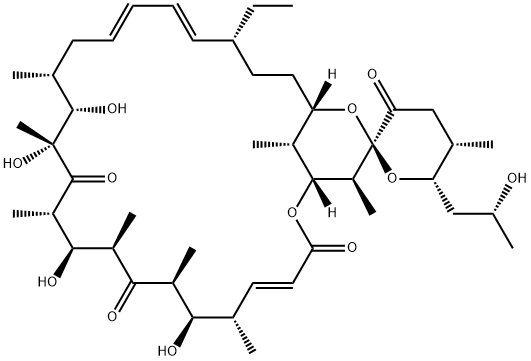Oligomycins are macrolides created by Streptomyces species that can be toxic to other organisms. Different oligomycin isomers are highly specific for the disruption of mitochondrial metabolism. Oligomycin B is a nonselective inhibitor of the mitochondrial F1FO ATP synthase. Oligomycin B (1-10 μM) can reduce the rate of ATP depletion in myocardial ischemia and decrease calcium-induced calcium release oscillation frequency of rat sensory neurons.
Oligomycin B is an antibiotic that acts as a nonselective inhibitor of ATP synthase.
Oligomycin B, a minor component of the oligomycin complex isolated from selected strains of Streptomyces, is an inhibitor of mitochondrial F1F0-ATPase. It makes cells more susceptible to cell death, and also leads to a switch in the death mode from apoptosis to necrosis.
previous study found that oligomycin b and aurovertin b were able to inhibit both the synthase and the hydrolase function, which not only rendered them difficult to be experimentally used, but also precluded them from being therapeutics. aurovertin b bound between the subunits catalytic f1 domain of the f1f0 atpase, where it prevented the conformational changes required for the catalytic cycle of this enzyme, whereas oligomycin bound to the f0 domain and blocked proton flow [1].
in a previous animal study, intracranial pressure measurements were performed in sd rats treated by intraperitoneal injection of vehicle, cyclosporine a, or oligomycin b. it was found that cerebral edema and mitochondrial impairment could be significantly worsened by treatment with oligomycin b, whereas a noticeable improvement could be observed in animals that received injections of cyclosporine a [2].
[1] g. j. grover and j. malm. pharmacological profile of the selective mitochondrial f1f0 atp hydrolase inhibitor bms-199264 in myocardial ischemia. cardiovasc.ther. 26, 287-296 (2008).
[2] vlodavsky e, palzur e, shehadeh m, soustiel jf. post-traumatic cytotoxic edema is directly related to mitochondrial function. j cereb blood flow metab. 2017 jan;37(1):166-177.


